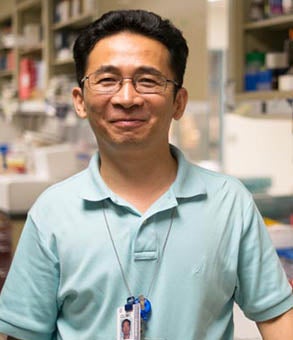Xuefeng Liu
Xuefeng Liu, MD

Professor, Director of Telomeres & Cell Immortalization Program
Department of Pathology
Email
xl24@georgetown.edu
Bio
Dr. Liu is a Professor in the Department of Pathology, serves as Director of Telomeres and Cell Immortalization Program within Center for Cell Reprogramming (CCR) and Scientific Director of Conditional Reprogramming Laboratory (CRL). Dr. Liu’s research interests focus on the roles of papillomavirus oncoproteins and telomerase in cell immortalization which is a very early stage of human cancer. The E6 and E7 proteins from high risk HPVs were first identified as targeting to disruption of cell cycle controls. The simultaneous expression of E6 and E7 appears to be requisite for cervical cancer. E6 protein has the unique property of increasing cellular telomerase activity by engaging both transcriptional and post-transcriptional mechanisms and this activation has been considered a critical and rate-limiting step in the progression to malignancy. His work has defined two major cellular targets for E6 oncoprotein, Myc and hTERT, which play a critical role in cell immortalization (PNAS 2003, JBC 2005, JVI 2007 and 2008, Virology 2008, BCTR 2009). Recently, his group has discovered that the E6 protein also interacts directly with the hTERT protein (PNAS 2009) and that E6 and E7 induce immortalization through non-telomere/non-catalytic functions of hTERT (PLoS Pathogens 2013). These studies are funded by a new grant from NIH. Together with Dr. Richard Schlegel, Dr. Liu recently co-invented a new cell technology, CRC technology, which was described in the Journal of Clinical Investigation (2010), American Journal of Pathology (2012, 2013), New England Journal of Medicine (2012), PNAS (2012), PLoS ONE (2014) and Oncotarget (2014). This technology allows us to rapidly propagate patient-derived normal and tumor (diseased) cells infinitely. Importantly, he utilized this technology to identify infection of HPV 11 and an effective therapy for a patient with metastatic pulmonary tumors arising from laryngeal papillomatosis. These results represent the first successful example of individualized therapy (NEJM). Dr. Liu has trained more 50 researchers from NIH/universities – Harvard, Yale, Duke, Stanford, Arizona, Wake Forest, UNC, Thomas Jefferson, CUHK, Mayo, MD Anderson to name a few – as well as scientists at Georgetown University to use CRC technique in their research. This training also resulted in a broad spectrum of intramural and extramural collaborations. Currently, Dr. Liu is leading the program of Cell Immortalization and direct (Scientific) Conditionally Reprogramming Laboratory (CRL) together with Dr. Ewa Krawczyk. He is also collaborating on different aspects/applications of CRC with many extramural (NIH, Harvard, MGH, MD Anderson, UNC, Mayo, etc.) and intramural (laboratories of Drs. Priscilla Furth, Anna Reigel, Anton Wellstein, Yun-Ling Zheng, Maria Laura Avantaggiati, Tony Dritchilo, Chip Albanese, etc.). As principle investigator or co-investigator, his research is currently supported by several grants from NIH (R01, R33, R21), Cheery Blossom Breast Foundation, MedStar Health Research Institute and NCI-CCSG. His ongoing projects include the role of non-canonical functions of hTERT in cell immortalization, role of HPV, mutant p53 and Myc in Head and Neck Tumor and cervical cancer, role of p53 and cytoskeleton remodeling in conditionally reprogramming, in vitro and in vivo differentiation of CRCs. He currently serves as an Academic Editor of PLoS ONE and as a board member of Virus Genes, and as a reviewer for PNAS, Cancer Research, Nucleic Acid Research, Journal of Virology, International Journal of Cancer, International Journal of Biochemistry and Cell Biology, Journal of Cellular and Molecular Medicine, Carcinogenesis, PLoS One, Molecular Cancer Research and Gynecologic Oncology. Dr. Liu obtained his medical and biochemistry training in China and postdoctoral training with Dr. Raymond Schinazi at Emory University and Dr. Thomas Zheng at National Cancer Institute (NCI), respectively.
